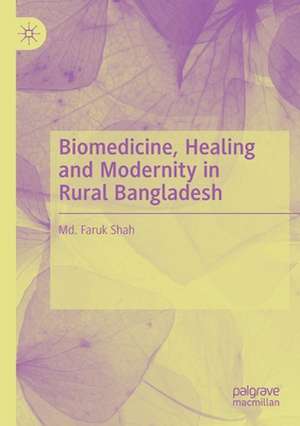Biomedicine, Healing and Modernity in Rural Bangladesh
Autor Md. Faruk Shahen Limba Engleză Paperback – 10 ian 2021
Toate formatele și edițiile
| Toate formatele și edițiile | Preț | Express |
|---|---|---|
| Paperback (1) | 389.31 lei 6-8 săpt. | |
| Springer Nature Singapore – 10 ian 2021 | 389.31 lei 6-8 săpt. | |
| Hardback (1) | 394.12 lei 6-8 săpt. | |
| Springer Nature Singapore – 16 dec 2019 | 394.12 lei 6-8 săpt. |
Preț: 389.31 lei
Nou
Puncte Express: 584
Preț estimativ în valută:
74.50€ • 79.66$ • 62.11£
74.50€ • 79.66$ • 62.11£
Carte tipărită la comandă
Livrare economică 17 aprilie-01 mai
Preluare comenzi: 021 569.72.76
Specificații
ISBN-13: 9789813291454
ISBN-10: 9813291451
Pagini: 323
Ilustrații: XIV, 323 p. 1 illus.
Dimensiuni: 148 x 210 mm
Greutate: 0.45 kg
Ediția:1st ed. 2020
Editura: Springer Nature Singapore
Colecția Palgrave Macmillan
Locul publicării:Singapore, Singapore
ISBN-10: 9813291451
Pagini: 323
Ilustrații: XIV, 323 p. 1 illus.
Dimensiuni: 148 x 210 mm
Greutate: 0.45 kg
Ediția:1st ed. 2020
Editura: Springer Nature Singapore
Colecția Palgrave Macmillan
Locul publicării:Singapore, Singapore
Cuprins
Chapter 1: Introduction.- Chapter 2: The Public Healthcare Bureaucracy: Narratives from Rural Clinics.- Chapter 3: Health Policies, Practices and Public Health Centres.- Chapter 4: Private Healthcare, Quality and Corruption.- Chapter 5: Biomedicine and Modernity: The Case of the “Village Doctors”.- Chapter 6: Pharmaceutical Promotion, Quality and Governance.- Chapter 7: Gendered Politics: Family Planning and Reproductive Health.- Chapter 8: Local Biomedicine: Structural Violence and Social Inequailty.
Notă biografică
Md. Faruk Shah is Associate Professor of Development Studies at the University of Dhaka, Bangladesh. Prior to joining this university, he served as a faculty member of Anthropology at Rajshahi University. Shah holds a PhD in anthropology from the University of Auckland, New Zealand. His research interest includes medical anthropology, health, sustainable development, social history, and ethnicity.
Textul de pe ultima copertă
This book provides an ethnographic account of the ways in which biomedicine, as a part of the modernization of healthcare, has been localized and established as the culturally dominant medical system in rural Bangladesh. Dr Faruk Shah offers an anthropological critique of biomedicine in rural Bangladesh that explains how the existing social inequalities and disparities in healthcare are intensified by the practices undertaken in biomedical health centres through the healthcare bureaucracy and local gendered politics. This work of villagers’ healthcare practices leads to a fascinating analysis of the local healthcare bureaucracy, corruption, structural violence, commodification of health, pharmaceutical promotional strategies and gender discrimination in population control. Shah argues that biomedicine has already achieved cultural authority and acceptability at almost all levels of the health sector in Bangladesh. However, in this system healthcare bureaucracy is shaped by social capital, power relations and kin networks, and corruption is a central element of daily care practices.
Caracteristici
Offers a unique anthropological critique of biomedicine in rural Bangladesh Employs critical and interpretative approaches in anthropology to examine the meaning and nature of biomedicine, addressing how biomedicine has been recognized and accommodated in the local medical system of rural Bangladesh Demonstrates how biomedicine is localized through an intricate web that includes historical political economy, geography, sociocultural settings, social hierarchy, bureaucracy, accountability, corruption, and a healthcare system characterized by medical pluralism
